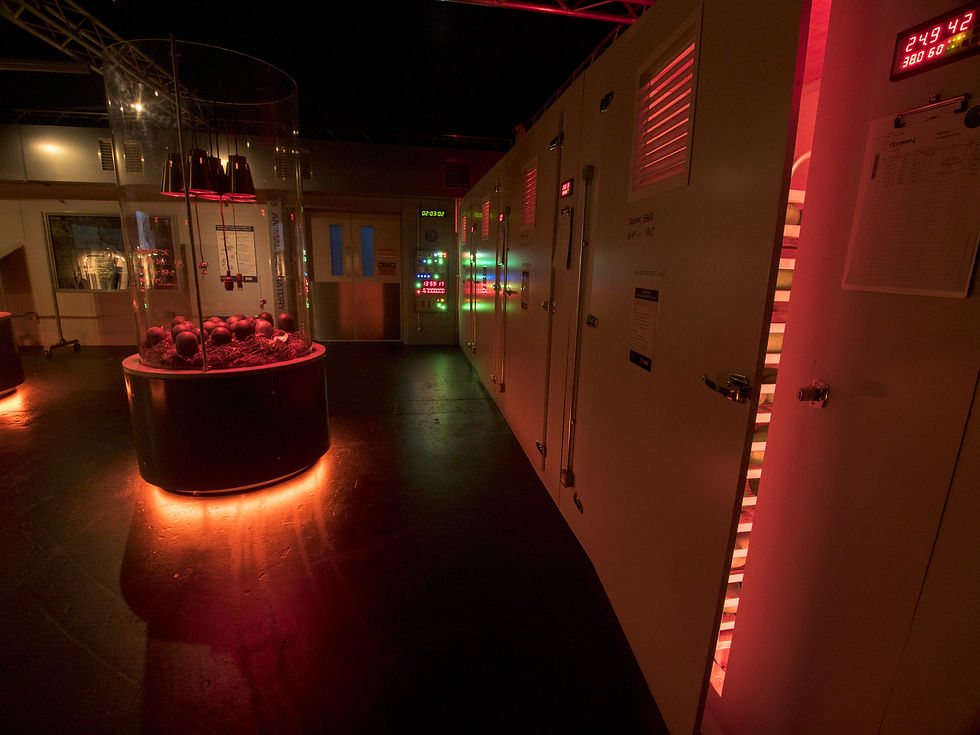DINOSAURS IN THE WILD
2017 - 2018
This event was a 1-hr guided immersive experience taking the audience back to the time of the dinosaurs where a research facility has been built to study the wildlife. This case study focuses on our design and implementation of the 140-channel audio system and complex show control system that drives every part of the experience.
Loudspeaker system
The loudspeaker system consists of 140 channels across 35 Powersoft Quattrocanali 1204 amps connected on main and backup DANTE networks. 200 AUDAC loudspeakers of various models are distributed throughout the experience. The attraction consists of several rooms, each room has an atmos system for sounds of A/C and machinery as well as loudspeakers for specific sound effects. Each of the time travel vehicles has a 24-channel loudspeaker system and The Lookout, the large space, uses over 60 loudspeaker channels.














Audio control system
The audio control system sits on a dual-redundant DANTE network for inputs and outputs. The inputs include the Qlab replay systems, live cabled and wireless microphones from the tour guides and outputs from Brightsign players local to displays throughout the experience.
The replay consists of three dual-redundant Qlab sessions (6 in total) running on Mac mini's with Focusrite DANTE PCI cards in external caddies. The Qlab machines provide Time Code to video for synchronisation and to the various clocks distributed around the attraction that the cast use to keep up with show timings (this is discussed in detail later). The Qlab machines also provide MIDI triggers to the lighting control system for specific moments.
The Qlab systems are controlled by an AMX control system that the stage manager uses to run the show and the technicians use to prepare and test the systems. This is discussed in detail later.

Show Control Systems
The show control systems for Dinosaurs in the Wild consist of an AMX control system that is the main logic processor in the system taking inputs from buttons, sensors, triggers and logic ports to trigger actions and sequences within the audio, lighting and video systems. The system consists of a main and backup NX220 processor and multiple remote I/O and relay interfaces located in the various control system racks. Luis Miranda looked after all the programming which controlled every element of the experience.

User Interface
The gallery below shows the control pages that were created for the users and technicians to run and maintain the system. The elegance of the system was in its simplicity in that a whole show could be run from the home page once system checks had been completed. Each page has a brief description of the functions available .




Keeping the show running to time
One of the more complex parts of the control system was to devise a method to keep the tour guides on time so that they would move their guests from one room to the next simultaneously. We used Time code from the Qlab machines running over the DANTE network to analog adapters connected to Time Code display clocks. Take a look at the photos below and you can see a wall clock in each space, two in some spaces, that we used to keep the cast moving.
If cast needed more time due to an issue with a guest, they could call it through to the stage manager over radio and the stage manager would add 60 or 120 second pause, during which time the clocks stop counting down and a red LED mounted to the bottom of each clock switches on. Once the pause period has expired the red LED switches off and the count down continues.


















IP Camera Systems
As part of our Show Control system we also designed and installed a 16-camera IP system to allow the stage management team to monitor every part of the experience from the show control room. The plan below shows the camera locations and the numbers.

A video produced by Powersoft all about the technology behind the experience.
ACKNOWLEDGEMENTS
The people and companies that made it happen.
A huge thanks to the team from DITW including Executive Producers Jill Bryant, Bob Deere, the creative team and Technical Producer Nick Levitt for getting us involved.
Our Client
The audio and show control systems were designed by Scott Willsallen and Luis Miranda with sound design content creation by Bobby Aitken and Fergus O'Hare. Paul PJ Johnson managed the audio installation and relocation works.
Our Team
Thanks to Scott Arnold and Rob Tory from Autograph for supplying the systems and packaging them for touring. A big thanks to Powersoft for their support throughout the project.


